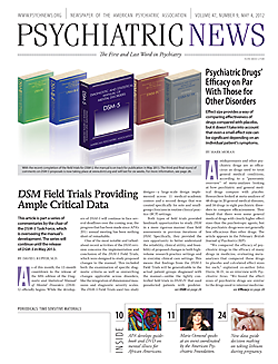Do elderly residents who receive antipsychotic drugs in nursing homes have a greater risk of dying than their nonmedicated neighbors? Yes, and the severity of the risk depends on which drug they are taking.
That’s the conclusion of researchers at Brigham and Women’s Hospital and Harvard Medical School, who published their study in the February 23 BMJ.
Led by Krista Huybrechts, Ph.D., an instructor in medicine in the Division of Pharmacoepidemiology and Pharmacoeconomics at the hospital, the team of researchers performed a population-based cohort study with linked data from Medicaid, Medicare, the Minimum Data Set, the National Death Index, and a national assessment of nursing-home quality. The participants were 75,445 new users of antipsychotic drugs (haloperidol, aripiprazole, olanzapine, quetiapine, risperidone, and ziprasidone; other antipsychotics were excluded because they were used by too few patients). All participants were aged 65 or older, eligible for Medicaid, and living in a nursing home during 2001 to 2005.
“The appropriate use of prescription medications in older patients is an important public-health concern,” Huybrechts explained to Psychiatric News when asked to describe the impetus for the project. “Older patients are more vulnerable to the side effects of all drugs, and psychotropics in particular, because of age-related changes in pharmacodynamic and pharmacokinetic processes. Because of polypharmacy, the chance that an older individual will be taking more than one medication with similar side effects increases, as does the risk of adverse drug interactions. The continued high use of antipsychotic medications in nursing-home residents, despite the FDA health advisories, motivated me to examine more closely the comparative safety of these agents.”
Huybrechts is referring to the Food and Drug Administration’s (FDA) 2005 Public Health Advisory in which the agency said that it had determined the treatment of behavioral disorders in elderly patients with dementia with atypical (second generation) antipsychotic medications is associated with increased mortality. That advisory led to black-box warnings being added to the labels of all atypical antipsychotics. Subsequent studies found risks at least as high among users of conventional antipsychotics, and the FDA issued a similar warning for such drugs in 2008.
In their report, Huybrechts and colleagues cited a recent audit by the Department of Health and Human Services that showed continued growth in the number of people with dementia. That increase, along with the perceived need for some type of intervention in patients with severe persistent symptoms, and a paucity of effective alternative pharmacological or behavioral approaches, means the use of antipsychotic drugs in nursing homes is likely to remain substantial.
Their results were daunting, with Huybrechts and her colleagues finding that there is a variation in the risk of death according to the type of drug used in elderly residents receiving antipsychotics in nursing homes. Compared with risperidone users, for example, haloperidol users had double the risk of mortality within 180 days, and quetiapine users had a decreased risk. The effects were strongest shortly after the start of treatment and remained after adjustment for dose. No clinically meaningful differences were observed for the other drugs. There was no evidence that the treatment effect differed for patients with a diagnosis of dementia or behavioral disturbances. A dose-response relationship was observed for all drugs except quetiapine.
The findings about haloperidol were especially concerning, but consistent with those of previous observational studies, and Huybrechts believes they have clinical importance. “The current FDA advisories for antipsychotics do not distinguish between individual agents and therefore offer no guidance to clinicians who have decided to proceed with drug treatment for severe and refractory behavioral problems,” she told Psychiatric News. “Our hope is that clinicians who are currently prescribing haloperidol to manage behavioral problems associated with dementia will reconsider this practice … and will consider prescribing an alternative agent instead if they feel that pharmacologic treatment is indicated.”
Huybrechts said the evidence provided by the study reinforces the risks associated with the use of antipsychotics and underscores the need to try alternative means of dealing with behavioral problems in elderly patients with dementia. “While our findings cannot tackle the efficacy-safety tradeoff involved in the decision to proceed with drug treatment for severe and refractory behavioral problems, they can contribute to decision making regarding treatment,” she said.
Huybrechts and her colleagues are completing a companion study that evaluates antipsychotic agents in community-dwelling elderly individuals, as opposed to nursing-home residents.
This study was supported by awards from the Agency for Healthcare Research and Quality, and researchers Huybrechts and Sebastian Schneeweiss, M.D., were partially funded by the National Institute of Mental Health.

“Differential Risk of Death in Older Residents in Nursing Homes Prescribed Specific Antipsychotic Drugs: Population-Based Cohort Study” is posted at www.bmj.com/content/344/bmj.e977 . 
